THE “I” IN PSAI – SOUTH AFRICA
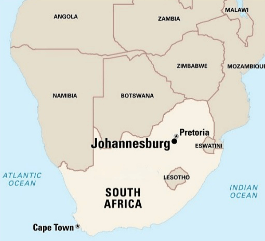
BACKGROUND
Portable sanitation became commonplace in the United States in the 1960s, and in the early 1970s, the industry expanded into Europe, specifically Germany, thanks to Fred Edwards and his company, Dixi. The late 1970s saw the beginnings of the industry in Australia and then New Zealand. The dawn of the 1980s saw international expansion reach South Africa.
South Africa, twice the size of the state of Texas, is an interesting area of the world. In the age of European Exploration in the late 1400s and beyond, the “Cape of Good Hope” at the southern end of the African continent was the navigable route from the Atlantic Ocean to the Indian Ocean and then on to the continents of Asia and Australia. South Africa has been among the world’s leaders in the mining of diamonds (discovered in 1867), gold (discovered in 1886), coal, and other precious metals (iron ore, silver, chromium, titanium, and uranium).
Originally colonized by the Portuguese and the Dutch, the British formed the Union of South Africa in 1910. From 1948 to the early 1990s, South Africa was governed under the system of apartheid (segregation), which thankfully came to an end with the election of Nelson Mandela as President in 1994. After this time, international sanctions against the country ended, and the economy began to modernize and to grow.
BEGINNINGS OF PORTABLE SANITATION …
ALEX MURRAY (PTY) LIMITED
In researching the PSAI archives from our founding in 1971, the first instance of the portable sanitation industry in South Africa is found in the March 1982 “PSAI in Action” Newsletter:
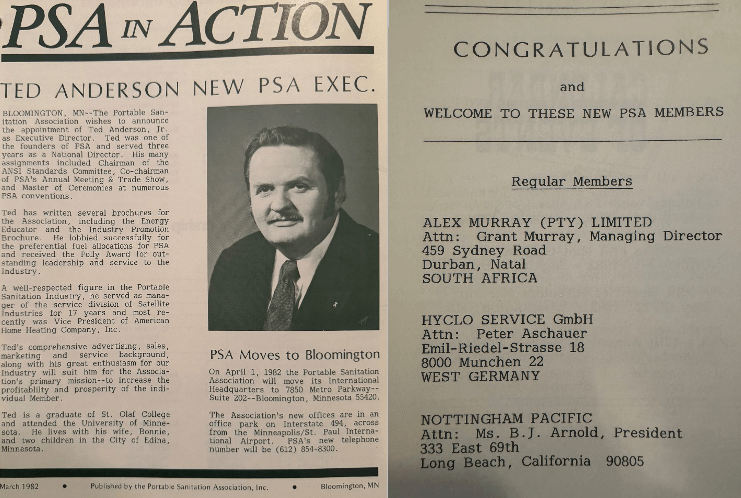
Grant Murray, Managing Director, established Alex Murray Limited as the first member of the PSAI from South Africa. The Alex Murray Company, founded in 1939, offered sheet metal and plumbing products and services. Plumbing eventually led the company to enter the portable restroom marketplace under the name of Sanitech. Grant continued to serve as the PSAI contact for the company until 2006.
SANITECH
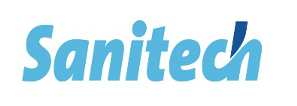
Robert Erasmus, Senior Business Executive – Managing Director of Sanitech, has been with the company since 2008. He shares this interesting and informative history of Sanitech:
“Sanitech was founded in 1974 as the first portable toilet hire company in South Africa to supply sanitation facilities to areas in which no sanitation infrastructure existed.
In 1996, Sanitech established its Hygiene Division, which has since experienced significant growth. Today, this division provides a comprehensive suite of integrated solutions, including washroom hygiene, deep cleaning, sanitary waste management, specialized services, and pest control. It is dedicated to delivering reliable, high-quality services that meet the diverse needs of clients across various sectors.
In 2007, Sanitech was acquired by Waco International, a global industrial services group. Waco International operates across a diverse range of sectors, offering solutions in formwork, shoring and scaffolding, insulation, painting and blasting, hydraulics, suspended access platforms, relocated modular buildings, portable sanitation, and integrated hygiene services. Since joining the Waco group, Sanitech has significantly expanded its footprint, enabling the company to enhance its service capabilities and reach a broader client base across Southern Africa.
A standout innovation with the Toilet Hire division is the Khusela Toilet, a groundbreaking alternative to traditional open-pit latrines. Engineered to eliminate the need for a pit, it features a secure, sealed service hatch that prevents any waste exposure to users, while ensuring zero environmental and groundwater contamination. This solution reflects Sanitech’s strong commitment to sustainability and is fully aligned with the company’s ESG (Environmental, Social, and Governance) objectives.
Today, Sanitech’s Toilet Hire division operates an extensive network of branches across South Africa, with additional branches in Namibia and Mozambique. It manages the largest rental fleet in the country, comprising over 30,000 units and 330 service vehicles. The division also provides septic tank services and wastewater treatment plant solutions, further enhancing its comprehensive sanitation offerings.
As Sanitech marked its 50th anniversary in 2024, the company reaffirms its commitment to delivering innovative hygiene and sanitation solutions that deliver health and dignity for all, and continues to live out its purpose on enabling a better tomorrow, EVERY DAY.”
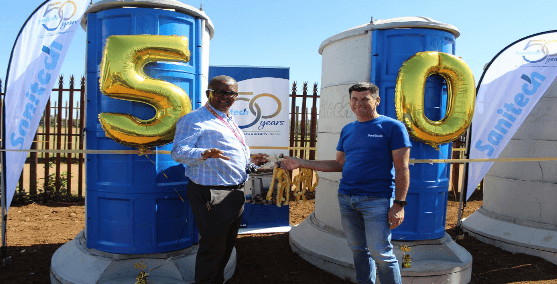
In 2024, Sanitech celebrated the 50th Anniversary of its founding. A proud member of the PSAI, Sanitech continues to serve and to provide for growth in their country.
HUT & LOO HIRE
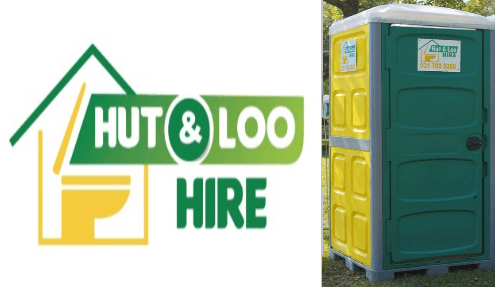
This company began in 1983 as a franchise of Rent A Loo. Rent A Loo was founded by Gordon Esden, Neville, and Andy Kennard in Australia in 1978. (Please see “The History of Portable Sanitation in Australia” for more information about longtime PSAI Member Gordon Esden and his company.)
In July 1988, Loo Hire CC was formed as the company began manufacturing both huts (sheds) and loos (portable restrooms). In 1992, after success in both of these markets, Loo Hire and Hut Hire were combined to form Hut & Loo Hire.
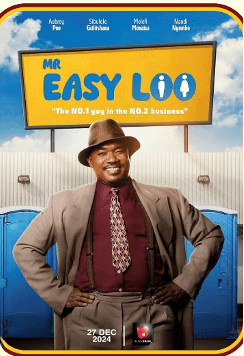
EASY LOO
Sam Matona began his career as a sales representative for Nestle and later started his own pest control business, which led to the founding of “Easy Loo” in the early 1980s. He established a successful company in Soweto that grew in size and stature for over 20 years. In 1992, Matona was voted “Sowetan’s Nation Builder of the Year” for his business skills. Sam passed away in 2008 at age 54, but this company and its owner were not forgotten, as you will see!
“MR EASY LOO” is a movie based on the life of Sam Matona, released on Netflix on December 27, 2024. This is the second production based on our industry - the Australian movie, “Kenny” from 2006, being the first.
“MR EASY LOO” follows Sam’s life through the difficulties and challenges of trying to succeed in business during apartheid. There is humor and laughter mixed in with this inspiring story of dedication and determination in founding a successful business.
MR LOO TOILET HIRE / HITEC PLASTICS
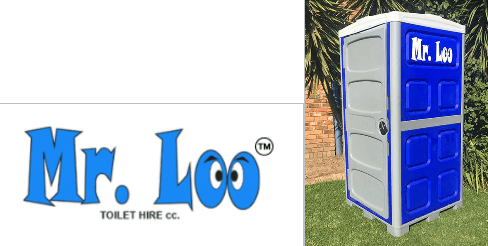
History
Jorge Alves founded Mr Loo in 1989 with 5 standard units, and today, as a 2nd-generation company, it has over 1,500 units. He shared his story with me in a recent conversation. I am sure that you will find it as interesting and as inspiring as I did.
“I believe in hard work and honesty. I began working at an early age after school and on weekends. At 14, I quit school and began working full-time in the food industry. After a few years of very long days, I applied for a job at Gordon and Furman Party Hire in 1983. The company provided all of the essentials for customers who were hosting parties, family gatherings, and special events.”
Jorge not only became familiar with the product line and how to run a business, but, more importantly, he learned and practiced excellent customer service. He says that “Gordon and Furman were my university.”
Jorge worked at this party hire company from 1983 to 1999. Amazingly, he never missed a day of work in his years of employment!
What attracted him to the portable sanitation industry? “I had sublet some portable units for a few events, and I saw this as an area of growth in the coming years. I decided to leave Gordon and Furman and to start out on my own.”
At the age of 35, Jorge purchased 5 units and modified his personal vehicle into a service truck. “With a small motorbike trailer attached to my car, I was in business,” he relates. His company, Mr. Loo, became the 4th toilet company in South Africa.
Through his philosophy of honest and hard work, Mr Loo began to grow. He soon bought a used service truck and hired employees. Jorge also has the gift of “invention,” and soon designed and built his own trailers that would accommodate 10 units each.
Mr Loo grew during the 1990s, and other competitors soon joined the South African marketplace. Jorge summarized his philosophy in dealing with a growing number of competitors.
“Sanitech was obviously the largest competitor, but amazingly, it never really worried me. It was the smaller hungry companies that raced to compete against me and to take the job away from us. I believed in good service, however, and that was my Ace card.”
HITEC PLASTICS
Jorge’s design and building capabilities continued to produce successful results. Established in 2009, as a subsidiary of Mr Loo Hire, this company began as an assembly outlet for portable restrooms. As the worldwide recovery from the Great Recession of 2007-2009 began, units that had once been cheaper to import than to build were now more expensive. As a result of Jorge and his company’s innovative spirit, Hitec expanded in 2012 and began producing units.
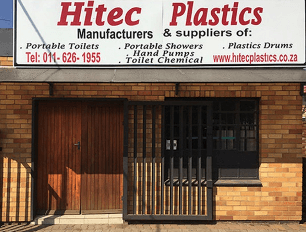
Hitec Plastics produced their own “VIP Flushing Unit” with all research and production being in-house. They added to their product line with the “FAST LINE” range of products and the newest “CUBE LINE.” As described on their website:
“All units are easy to assemble; they are put together with a handheld pop rivet gun in less than 20 minutes by almost anyone, no special skills needed. This means larger unassembled loads … cutting transportation costs to less than half, and in turn saving our valued customers money.”
Company Culture
Within Mr Loo, Jorge created a culture of honesty and fairness. When his daughter, Lee, graduated from university, Jorge interviewed her and hired her as the receptionist even though she had a business degree. “I wanted my daughter to learn the business from the ground up, and she did.” Today, Lee-Ann runs Mr Loo.
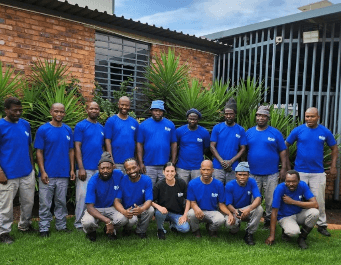
Lee-Ann shares her thoughts about Mr Loo and her father’s business philosophy:
“My father has really taught me what hard work is and how to run a business from bottom to top. He has taught me persistence as well as thinking outside the box. His level of creativity, positivity, and belief that nothing can keep you down for too long is what I admire the most about him. He truly has been an amazing mentor in my life, and I am double lucky because I also get to call him ‘Dad.’”
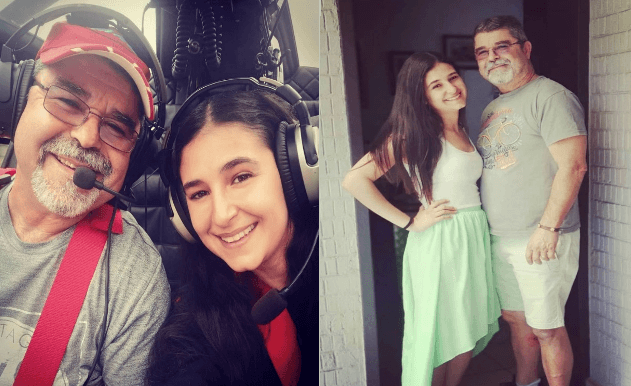
Whether piloting a plane or Mr Loo, this is a successful father-daughter team.
Jorge Alves is yet another outstanding international leader who has advanced and improved our industry, and Lee-Ann is certainly following in his footsteps.
ENVIRO LOO
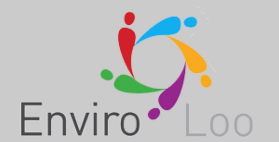
Founded in 1993, Enviro Loo has always sought innovation in our industry by offering alternatives to traditional portable restrooms and unsafe pit toilets. The Enviro Loo Waterless System was invented by Dr Brian La Trobe and went into production with the establishment of the company.
The Enviro Loo is a dry toilet system that separates solids from liquids. Solar heat creates currents of air that evaporate the liquids while drying the solids. The waste drops onto an inclined perforated drying plate while the liquids pass through the plate to a tank below. This waste is reduced to approximately 5% of its original volume, the water can be recycled, and no fresh water is needed to maintain the system.
Enviro Loo has received numerous awards for this innovative system, beginning in 1997 with the Top Technology 100 Award from South Africa. In 2021, the Enviro Loo Clear WESS (Water Efficient Sanitation System), a 100% recycling toilet system, was presented with an Energy Globe Award. Presented annually in over 180 countries, the Energy Globe Award recognizes innovation in providing solutions to environmental problems throughout the world.
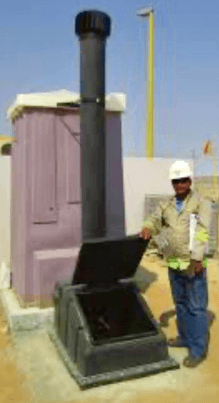
AMPS AFRICA (ASSOCIATION OF MOBILE AND PORTABLE SANITATION)
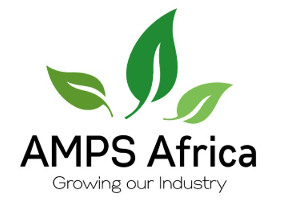
From the PSAI to PSE (Portable Sanitation Europe) to WTO (World Toilet Organization), associations are valuable organizations to advance our industry on an international basis. South Africa is fortunate to have the Association of Mobile and Portable Sanitation (AMPS) working for its members, the country, and the industry.
Founded in 2017, AMPS has grown to 41 member companies and 6 sponsors. The AMPS works to expand and promote the portable sanitation industry in this part of the world, and they have been quite successful. The Mission Statement is very inspiring for the industry and is applicable on a worldwide basis.
The AMPS Mission Statement:
-
Be a point of reference for members, suppliers, manufacturers, and councils.
-
To improve the perceptions regarding our industry.
-
To improve corporate governance and the environmental impact of our industry.
-
To implement standards and best practice guidelines for our industry.
-
To make available training standards and facilitators to members.
-
To protect and grow our industry, including our network.
-
To promote a yearly conference and invite subject matter experts to increase knowledge about our industry.
-
To get a better understanding of the size and opportunities within our industry.
Gary Bolt, Co-Chairman of AMPS, shares that the association has grown steadily since its founding. “From the first meeting in a small restaurant with 17 or so people, we continue to grow and to expand our reach each year,” he relates.
Gary says that in working on standards for South Africa, AMPS relied on the European Union Standards as its baseline. Once these standards were developed, the Department of Sanitation adopted these measures as governmental guidelines for the country.
AMPS is also concerned with water conservation, which is extremely important on the continent of Africa. Portable sanitation saves fresh water, and AMPS works to promote this fact.
At the annual conference, AMPS shares new technologies and breakthroughs with those in attendance in an effort to keep our industry at the forefront of public health and environmental awareness.
The 2025 AMPS Annual Conference was held on August 14th, and a record 64 delegates attended. This surpassed the previous year’s conference with 48 delegates. AMPS is growing and expanding its reach.
The Sponsors of AMPS include:
-
Atlas Plastics
-
Chembros
-
National Pride Trading
-
Pioneer Plastics
-
Sanitation for Africa
-
Satellite Industries
This logo represents the best in our industry in South Africa!
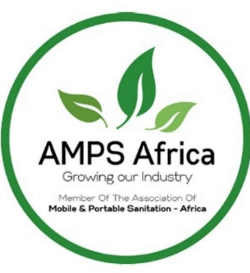
FINAL THOUGHTS
Though they did not enter the portable sanitation marketplace until the 1980s, South Africa has made significant contributions to our industry. In a part of the world where pit latrines and insufficient sanitation existed in large portions of the country, hard work and innovation by portable restroom companies have met the need while developing state-of-the-art waterless units and composting systems that are being adopted throughout the world.
